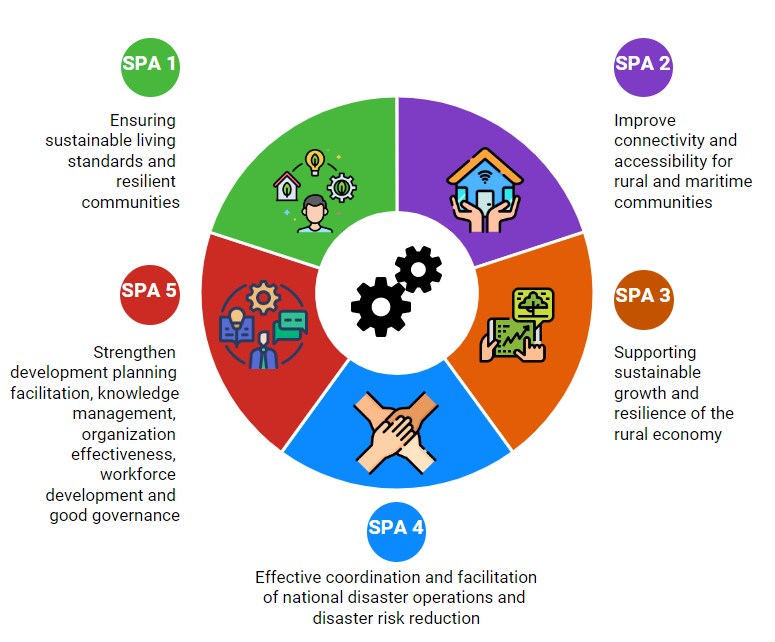There are five (5) “STRATEGIC PRIORITY AREAS (SPAs) which are key to achieving the Ministry’s Vision and Mission. These SPAs are derived from the Ministry’s SDP. SPAs 1-4 intends to improve outcomes for rural and maritime communities through risk informed development planning, improvements in access to services and opportunities and effective disaster risk management. SPA 5 relates to the skills, expertise and systems needed to support the achievement of these long term targets.

SPA 1 – Ensuring sustainable living standards and resilient communities
Goal: Rural and maritime communities have access to essential services such as clean water and sanitation, adequate housing and waste management, health, education and nutritional security.
A significant urban-rural gap exists, with rural communities generally facing challenges in accessing essential services, which serves as a fundamental right to an adequate standard of living and decent livelihood. The Ministry plays a key role in ensuring that rural and maritime priorities are elevated by national agencies to promote equitable access to essential services such as clean water and sanitation, adequate housing and waste management, health, education and nutritional security.
SPA 2 – Improve connectivity and accessibility for rural and maritime communities
Goal: Investment towards resilient infrastructure and services that improve connectivity of rural and maritime communities
The Ministry works with key service providers to improve and enhance the resilience of infrastructure and communications for rural and maritime communities. Where needed, the Ministry implements key programmes (farm roads, access roads) to support communities to connect to services. These services underpin the ability of communities to access health education and water (SPA1), markets and livelihood opportunities (SPA3) and support the coordination of effective disaster response (SPA4).
SPA 3 – Supporting sustainable growth and resilience of the rural economy
Goal: Rural and maritime communities realize their socio-economic and livelihood goals through sustainable use of their natural resources.
The Ministry facilitates inclusive socio-economic growth in remote areas by coordinating with partners to empower local communities to develop resilient livelihood opportunities and access to markets. Rural and maritime communities rely heavily on natural resources to support income generation from agricultural, forestry, fisheries and tourism activities and strengthening the sustainable management of these resources, taking into account future disaster and climate risk, is vital to their ability to sustain livelihoods. The Ministry will also work with key partners to identify opportunities to better utilize underutilized land, develop rural growth centers and facilitate investments in rural and maritime areas.
SPA 4 – Effective coordination and facilitation of national disaster operations and disaster risk reduction
Goal: Building resilience of communities to all hazards.
Critical to the process of building resilience of all communities in Fiji is the effective management of disaster and climate risks and their integration within the development process. The Ministry hosts the National Disaster Management Office and works with line ministries and agencies, stakeholders and development partners in coordinating and facilitating disaster risk management that includes risk reduction, preparedness and response.
SPA 5 – Strengthen development planning facilitation, knowledge management, organisation effectiveness, workforce development and good governance
Goal: A skilled and agile organization delivering efficient and effective services to rural communities through enabling and empowering line ministries and partners
The Ministry plays a key role in facilitating risk-informed development planning, collating and disseminating information and knowledge relevant to rural and maritime development and managing partnerships and relationships to support rural development and disaster risk management. To fulfil its mandate, the Ministry must communicate its role clearly with all partners and ensure that staff have the necessary skills to deliver. The Ministry will realign its structure and redefine roles to support our objective of improving efficiency and productivity. Competency based training and performance management will be strengthened to support the development of the workforce.


